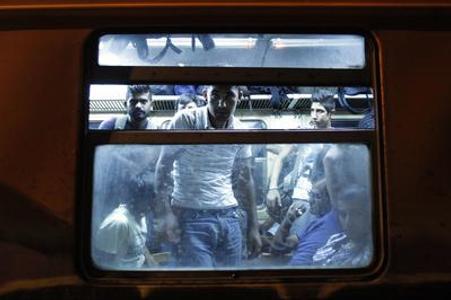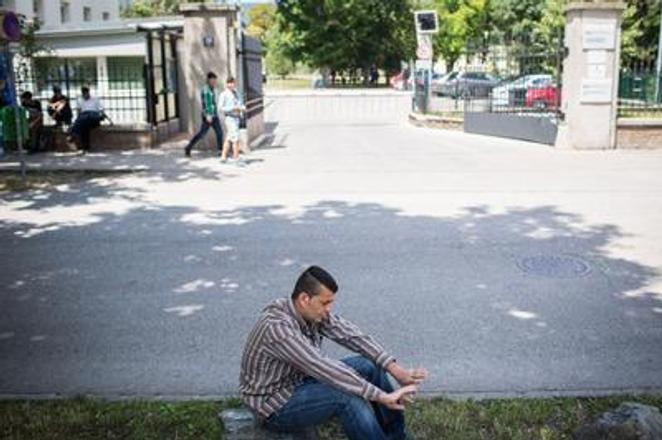Based on a recent bilateral deal, some 500 refugees seeking asylum in Austria will stay in Slovakia temporarily, until their asylum process is finished and, based on the results, they will either move back to Austria or be deported from the EU. The process typically takes a few months. Even so, people of the village of Gabčíkovo, where the refugees are to stay in a reopened refugee camp, express concern about terrorism targeting the local hydroelectric dam and initiated a referendum on whether they want refugees within the confines of their village.
Meanwhile in Austria, human rights watchdogs have expressed concern for the conditions asylum-seekers will live in.
Understanding between governments
Interior Minister Robert Kaliňák and his Austrian counterpart, Johanna Mikl-Leitner, signed the memorandum of understanding in Vienna on July 21. Based on the memorandum, Slovakia will house 500 asylum-seekers from Austria in its facility for refugees in Gabčíkovo, Trnava Region.
The people will be transferred back to Austria as soon as their asylum proceeding is wrapped up.

Even though Slovakia refused the compulsory quotas of migrants that some countries have been promoting in Brussels, “we do perceive the issue of the influx of migrants very sensitively”, Kaliňák said.
“Slovakia has received great support from Austria’s side in the past, that is why we decided to help out in this way.”
Austria has already registered over 70,000 asylum requests since the start of this year, according to Kaliňák.
The arrangement is such that Slovakia will pay for the accommodation and food for the migrants, while the Austrians will continue paying the costs of the health care, security service, and pocket money.
Gabčíkovo citizens worried
The facility in Gabčíkovo, belonging to the Slovak University of Technology in Bratislava which has a contract for it with the Interior Ministry, had been used as a refugee camp for 15 years, but in the last six years it has not served this purpose.
The reopening of Gabčíkovo refugee camp has been mentioned in the early reports on the deal between the two countries, notably a report in the Der Standard daily of Austria which pointed out some of the facility’s shortfalls.
The Interior Ministry, however, took several days to confirm Gabčíkovo facility will house the asylum-seekers, and in the meantime, tension built up among the Slovak public and especially among the citizens of Gabčíkovo.
The municipality announced a referendum to ask the citizens whether they did or did not agree with the refugees to be housed in Gabčíkovo. The referendum is scheduled for August 2.
In the statement approved by the municipal council on July 8 the mayor and the councillors, speaking in the name of the citizens of Gabčíkovo, distanced themselves from the government’s plans to take in the refugees and house them in Gabčíkovo, citing, among others, “experiences from the past”. They also state that neither the local authorities nor the citizens were informed about the government’s plans.
“In the interest of security and peace of mind of our citizens, the municipality will use all the available means against establishing the facility in question – a refugee camp,” the statement reads.
The Gabčíkovo authorities claim they are not indifferent to the fate of the refugees, but defend their position saying that it is hard to tell what problems and duties the refugee camp will mean to the village and “it would be almost impossible for us to tell who is an actual refugee and who of those come to our country with various other, dangerous, sinister intentions”.
The statement also mentions the water dam in Gabčíkovo as an important energy source, which they believe could be put at risk if refugees are let in the village.
The Gabčíkovo municipal office confirmed for The Slovak Spectator that they were preparing for the referendum, even as the result is unlikely to have any effect on the situation. The facility does not belong to the municipality.
Human rights watchdogs bark
There are also concerns from the Austrian side. Though the 500 refugees is a small number compared to the tens of thousands of asylum-seekers Austria is currently dealing with, the deal between Slovakia and Austria angered some Austrian human rights watchdogs, especially following the Der Standard report.
The head of the local branch of Amnesty International, Heinz Patzelt, said he felt “disgusted horror” about it, namely about Mikl-Leitner saying that it is a cheaper solution. It is as if the government was putting the refugees in a luggage storage, Patzelt said, as cited by Der Standard, calling it “pathetic and grotesque”. Austria could accommodate all refugees in dignified conditions, perhaps in private homes, he said.
The Slovak branch of Amnesty International (AIS) does agree with the claim that it is the responsibility of every country to make sure the conditions in the asylum proceeding fulfil international human rights standards, Lucia Bernátová, the organisation’s campaign coordinator, told The Slovak Spectator.
At the same time, Bernátová stressed that the deal between Slovakia and Austria has nothing to do with the resettlement scheme proposed by the European Commission, a proposal AIS supports.
“If some countries refuse this programme, they should adjust their national resettlement schemes in order to share the responsibility and show solidarity with the current humanitarian crisis, which is the worst since the end of World War II,” Bernátová said, and added that the AIS calls on the Slovak authorities to “open safe and legal ways to Slovakia”.
Slovakia to take 100 Syrians
At the July 20 meeting of interior ministers in Brussels regarding the relocation of 40,000 refugees currently staying in Italy and Greece, Slovakia confirmed it was willing to accept 100 refugees from Syria seeking asylum in Europe.
“We will try to integrate them in cooperation with charity organisations, and after successful integration they will stay to live in Slovakia,” the ministry wrote in the press statement.
With the argument of smooth integration, the government has all along reiterated that only Christian Syrian refugees will be selected.



 Refugee camp Traiskirchen (source: Sme)
Refugee camp Traiskirchen (source: Sme)